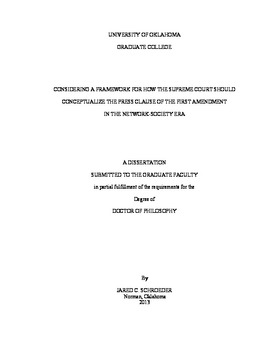| dc.contributor.advisor | Kerr, Robert | |
| dc.contributor.author | Schroeder, Jared C. | |
| dc.date.accessioned | 2013-10-28T12:58:24Z | |
| dc.date.available | 2013-10-28T12:58:24Z | |
| dc.date.issued | 2013-12 | |
| dc.identifier.uri | https://hdl.handle.net/11244/6391 | |
| dc.description.abstract | The Internet has made it possible for anyone to become a publisher, thus challenging traditional conceptualizations of the press and the press clause of the First Amendment, which has historically been understood in terms of the institutional media. The changes in the way members of a democratic society communicate have raised questions regarding how the courts should interpret the press clause in the network era. This dissertation utilized David Altheide’s qualitative document-analysis process to systematically assess three bodies of discourse in order to propose a unified framework in which the courts can ground questions concerning the future of the press clause in the network era. That method of qualitative document analysis was applied to the narratives represented within lower-court rulings concerning cases in which citizen publishers argued for press-related protections, Supreme Court decisions regarding Internet questions that relate to the First Amendment, and essential theoretical conceptualizations of the role of communication in a democratic society. Drawing upon the thematic insights that emerged through the analysis of the bodies of discourse, this dissertation proposes that courts focus on the process through which messages are composed and delivered. Such an approach is consistent with the Supreme Court’s press-clause jurisprudence and the dominant philosophical conceptualizations that emerged in the analysis regarding the role of the press in a democratic society, while at the same time relating with understandings regarding the unique dynamics of communication in the network era. | en_US |
| dc.language | en_US | en_US |
| dc.subject | Journalism. | en_US |
| dc.title | Considering a Framework for How the Supreme Court Should Conceptualize the Press Clause of the First Amendment in the Network-Society Era | en_US |
| dc.contributor.committeeMember | Gade, Peter | |
| dc.contributor.committeeMember | Craig, David | |
| dc.contributor.committeeMember | Self, Charles | |
| dc.contributor.committeeMember | Wert, Justin | |
| dc.date.manuscript | 2013-10 | |
| dc.thesis.degree | Dr.P.H | en_US |
| ou.group | Gaylord College of Journalism and Mass Communication | |
